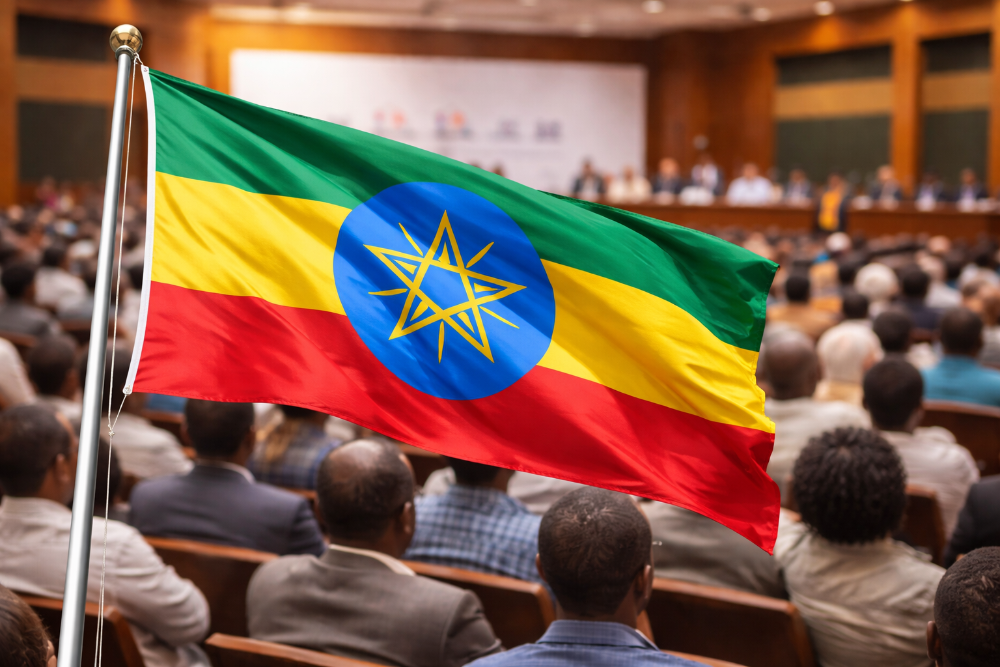ENA - ENA English
Headlines
Ethiopia Makes Strong Gains in Tea Development Under Green Legacy Program, Says PM Abiy
Jan 2, 2026 223
Prime Minister Abiy Ahmed announced that Ethiopia’s tea development initiative, implemented as part of the Green Legacy Program, is showing strong progress. In a message shared on his social media channels, the Prime Minister noted that the initial success in tea planting demonstrates the country’s potential to expand the sector. According to the Prime Minister, continued efforts in agro-processing and increased private sector involvement to add value will be crucial, adding if sustained, the initiative is expected to strengthen export earnings while also meeting domestic tea consumption needs. “The tea development initiative, which is part of the Green Legacy program, is being implemented successfully. The promising start observed in planting, if followed through with full agro-processing and supported by private sector participation to add value, will benefit our country through exports in addition to meeting domestic consumption needs,” he noted.
Ethiopia Reaches Agreement in Principle with Bondholders on Restructuring of 2024 Notes
Jan 2, 2026 685
Addis Ababa, January 2, 2026 (ENA)– Ethiopia's Ministry of Finance announced today that it has reached an agreement in principle with an Ad Hoc Committee of bondholders on the principal financial terms for the restructuring of Ethiopia’s 1 billion USD 6.625 percent Notes due 2024. Between 23 December 2025 and 1 January 2026, Ethiopia held restricted discussions with the Ad Hoc Committee, which represents institutional investors holding more than 45 percent of the outstanding 2024 Notes. The discussions focused on a potential restructuring of the Notes and were supported by advisors on both sides. Ethiopia was advised by White & Case LLP and Lazard, while the Ad Hoc Committee was advised by Weil, Gotshal & Manges (London) LLP and Ankura Sovereign Advisors LLP. The Ministry of Finance confirmed that these discussions resulted in an agreement in principle on the core financial terms of the restructuring. Ethiopia believes the agreed terms are consistent with the objectives of its International Monetary Fund (IMF) programme and comply with the Comparability of Treatment principle applied by its Official Creditor Committee (OCC). The agreed financial terms have been shared with the OCC for its non-objection and with the IMF to ensure alignment with Ethiopia’s long-term debt sustainability framework, according to the ministry. Ethiopia has also committed to continue working constructively and in good faith with the Ad Hoc Committee to finalize the non-financial terms of the new instruments to be issued as part of the restructuring. The agreement in principle remains subject to the completion of these discussions and the receipt of confirmations from both the IMF and the OCC. The Government further confirmed its intention to move swiftly toward implementation of the restructuring through an exchange offer and/or consent solicitation, targeting execution as early as possible in 2026. In its social media post, the Ministry of Finance expressed its appreciation to the Ad Hoc Committee and its advisors for their constructive engagement and cooperation throughout the negotiation process.
Ease of Doing Business in Ethiopia Flourishing: Mohan Group Companies CEO
Jan 2, 2026 517
Addis Ababa, January 2, 2026 (ENA)— Mohan Group Companies Chief Executive Officer, Harsh Kothari, said the ease of doing business in Ethiopia has been flourishing, following the measures taken by the government. The Mohan Group of Companies is a prominent Indian-Ethiopian family business in Ethiopia, leading the fourth generation of the family's legacy in the country's business landscape. Its CEO, Harsh Kothari, told ENA that the ongoing economic reforms is positioning Ethiopia to be a strong competitor in the global trading networks and to show confidence and resilience. The reforms have improved business environment and enhanced attractiveness to investors at the global level. The reforms primarily focus on opening sectors to foreign investment, modernizing finance and trade with e-services, improving forex management, and boosting private sector participation, among others. Kothari noted that Ethiopia’s economic reforms have had many stages, including the reform of the commercial code, the financial reform, the foreign exchange regime change. As a result of the various reforms taken, the ease of doing business, which is crucial in attracting investment, has been flourishing in Ethiopia, he added. Commenting on the recent visit of Prime Minister Narendra Modi to Ethiopia, the CEO said the visit of the Indian leadership to Ethiopia has been very pivotal in further strengthening the relationship between Ethiopia and India. According to him, Prime Minister Abiy Ahmed has also taken strong efforts to ensure that these strong relationships continue and Indian investors feel welcome in Ethiopia. Prime Minister Modi’s visit to Ethiopia is a strong and symbolic message, he said, adding that it gives a message to the business community and investors that have been working together a sense of belongingness. Generally, the economic reform, the market positioning, the African Continental Free Trade Area, and all the endeavors that are taking place in Ethiopia create a very conducive investment environment. The CEO also said that Ethiopia is going to be one of the most competitive and attractive places to do business. Ethiopia's comprehensive Homegrown Economic Reform (HGER) Agenda, initiated in 2019, has led to several significant achievements, particularly in macroeconomic stability, foreign exchange management, and sectoral growth. The reform achievements also include the increase of Foreign Direct Investment (FDI), substantial legal and regulatory reforms, and more conducive business climate.
Ethiopia Launches Advanced Training Programs to Realize ‘Digital Ethiopia 2030' Strategy
Jan 2, 2026 281
Addis Ababa, January 2, 2026 (ENA)— The Federal Technical and Vocational Training Institute (FTVTI) announced the launch of modern, specialized training programs designed to cultivate a highly skilled workforce capable of driving the Digital Ethiopia 2030 strategy. These initiatives are designed to cultivate a highly skilled workforce capable of leading the nation’s Digital Ethiopia 2030 strategy. The Digital Ethiopia 2030, recently inaugurated by Prime Minister Abiy Ahmed, aims to create an accessible, equitable, and reliable digital ecosystem across the country. According to Biruk Kedir, Director General of TVTI, this new vision builds upon the "Digital Ethiopia 2025" strategy, which established a strong foundation for transformation within the technical and vocational sectors. Biruk told ENA that the previous strategy empowered the institute to modernize its teaching methodologies and significantly improve digital literacy nationwide. To align with updated national goals, the institute is finalizing strategic documents to synchronize its operations with the specific objectives of Digital Ethiopia 2030, he emphasized. According to the director general, this transition includes a curriculum that prioritizes training in cutting-edge disciplines such as Artificial Intelligence (AI) and Cybersecurity. By equipping graduates with these high-level digital competencies, the institute aims to prepare a workforce capable of thriving in the modern global economy, he stated. Furthermore, these efforts are supported by a commitment to infrastructure growth, which involves reinforcing institutional structures and acquiring state-of-the-art technological resources to foster a world-class learning environment. According to Biruk, the ultimate goal of these efforts is to nurture a generation of professionals who are not only digitally proficient but also capable of developing indigenous digital technologies. Furthermore, Biruk said that the institute is actively reinforcing its institutional structure and acquiring the necessary technological resources. These efforts are aimed at nurturing professionals’ rich in digital skills and fostering an environment conducive to the further development of indigenous digital technologies.
Ethiopia Reaffirms Pan-African Commitment Through Expanded Regional Scholarships
Jan 2, 2026 440
January 2, 2026 (ENA)—Ethiopia has reaffirmed its commitment to Pan-African solidarity and people-to-people diplomacy by expanding regional scholarship opportunities for students from neighboring African countries. The announcement was made during a New Year welcoming ceremony at Bahir Dar University for newly arrived international students, according to Ministry of Foreign Affairs. Speaking at the event, Ambassador Nebiyu Tedla, Director General of the Public Diplomacy Directorate General at the Ministry of Foreign Affairs, said Ethiopia’s continued provision of full scholarships represents a strategic investment in regional cooperation, human capital development, and long-term stability. Ambassador Nebiyu emphasized that education remains a central pillar of Ethiopia’s foreign policy, serving as a powerful tool for fostering regional integration, mutual understanding, and shared prosperity across Africa. The Ministry of Foreign Affairs also reaffirmed its commitment to strengthening collaboration with Bahir Dar University and other higher learning institutions by aligning support with national and regional priorities. This includes facilitating academic partnerships, student and faculty exchanges, and international research cooperation to enhance teaching quality and global engagement. The ceremony featured cultural performances by students from Kenya, Uganda, South Sudan, Somalia, and Tanzania, showcasing the diversity and unity of the African continent. Bahir Dar University President, Dr. Mengesha Ayene, reiterated the university’s commitment to delivering quality education and providing a supportive academic environment for international students. Scholarship beneficiaries from across Africa expressed their appreciation to the Government of Ethiopia and Bahir Dar University for the opportunity to pursue higher education, while also thanking the Ethiopian people for their hospitality and warm welcome. Currently, more than 130 African students are enrolled at Bahir Dar University under regional scholarship programs, underscoring Ethiopia’s enduring role as a hub for Pan-African cooperation and shared development.
Politics
Ethiopia’s Sea Access Quest Crucial for Regional Harmony, Shared Prosperity: Scholars
Jan 2, 2026 488
Addis Ababa, January 2, 2026 (ENA)— Ethiopia’s pursuit of sovereign access to the sea is a rational and strategic necessity, essential for ensuring regional peace, security, and collective growth, Scholars said. They affirmed that Ethiopia is engaged in a pivotal diplomatic endeavor in the volatile Horn of Africa, a region where global powers frequently contend to safeguard their interests. This movement seeks to mend a historical fracture, moving the nation beyond the constraints of being a mere observer along the vital Red Sea corridor. The quest for sea access is rooted in long-term strategic planning designed to protect the national interests of both current and future generations, the underscored. According to the scholars, these diplomatic efforts are now gaining significant recognition within the international community. Ahmed Zekaria, a distinguished scholar of history and culture, noted that Ethiopia’s history and national honor are inextricably linked to the Red Sea and the Abay River. He emphasizes that these two bodies of water are not merely development options but are fundamental to the nation's existence and the protection of its sovereignty. Ahmed also emphasized that only three decades ago, Ethiopia possessed its own historical and natural gateways to the sea. Current initiatives are righteous actions intended to correct historical distortions and reclaim the nation’s natural endowments, he added. Furthermore, he expressed his beliefs that securing sea access ownership is a vital catalyst for the stability and mutual advancement of the entire East African region. Tofik Abdullahi, a Member of the House of Peoples' Representatives and former Ambassador to Yemen, on his part described the past maneuvers that distanced Ethiopia from its coastline as a regrettable chapter in history. The current diplomatic push has reached a decisive stage, he underscored. The Ambassador further elaborated that there will be an immense value of the East African coast and the Red Sea to global commerce. He emphasized that securing Ethiopia’s access to the sea would serve as a cornerstone for regional tranquility rather than a point of conflict. Ahmed further asserted that the efforts regarding Assab, which he identifies as Ethiopia’s legal, historical, and natural port must be pursued with renewed vigor. Supporting this sentiment, Tofik called upon all citizens to stand united in realizing this generational quest, describing it as the heart of the nation’s strategic interest.
East African Leaders Vow Bold Economic, Political, and Security Reforms in 2026
Jan 2, 2026 933
January 2, 2026 (ENA)—East African leaders have pledged sweeping economic, political, and security reforms in 2026, signaling a decisive shift from the challenges that affected the region last year. In their New Year addresses, the leaders outlined ambitious plans aimed at improving livelihoods and strengthening stability in this geopolitically critical part of the world. Each committed to promoting economic growth, accelerating digital transformation, strengthening democratic governance, and ensuring peace and stability within their nations. Ethiopia’s Prime Minister Abiy Ahmed extended New Year greetings to the international community, emphasizing the shared hope for peace, cooperation, and prosperity in the year ahead. He also highlighted Ethiopia’s unique calendar with a touch of humor, noting its potential to boost tourism, attract foreign investment, and support sustainable development. President William Ruto of Kenya focused on calming a restless youth population grappling with unemployment while presenting a performance scorecard ahead of planned development initiatives. Speaking from Eldoret in the North Rift region, he said: “2026 marks the moment when our journey to transform Kenya into a first-world economy begins in earnest. We are committing to a measurable mission to cut the number of Kenyans living below the poverty line by half… and to cut unemployment by half, ensuring that millions of citizens are productive.” He noted that four in every ten people live below the poverty line—over 20 million individuals struggling to meet basic needs. To support these goals, the government plans to establish two development funds expected to hold Ksh5 trillion (38 billion USD dollars), financing projects while reducing reliance on borrowing and further taxation. Ugandan President Yoweri Museveni struck a triumphant tone as he campaigned ahead of the January 15 elections under the National Resistance Movement banner. Speaking at Nakasero State Lodge, he described Uganda’s economic performance as “spectacular”: “The economy is robust, the majority of the population are happy, the country is peaceful, and our armed forces are at their strongest. By June 2026, the economy will reach 68.4 billion USD dollars, with GDP per capita at 1,399 USD dollars, firmly placing Uganda in the lower-middle income bracket.” Key growth sectors, he said, include coffee exports, tourism, and the knowledge economy—including the manufacture of electric vehicles and computers. Export earnings have exceeded imports, with 13.4 billion USD dollars in exports against 11.03 billion USD dollars in imports. Museveni acknowledged persistent socioeconomic challenges, including poverty, unemployment among graduates, infrastructure gaps, and corruption. “We still have poor people, unemployed graduates, and some bad roads due to underbudgeting and corruption. However, all these will be resolved—we have already moved 70 percent of homesteads into the money economy,” he said. Emphasizing youth engagement, he added: “It is your task, as young Rwandans, to sustain what we have built and take it further. I hope you are prepared for that duty, even when it requires sacrifices. On regional security, he thanked the United States and Qatar for facilitating the Washington Accords, aimed at restoring peace in eastern DR Congo. “Any threat to the peace and security of our people is unacceptable. State-supported violent extremism remains a real threat,” he warned. On her part, Tanzania's President Samia Suluhu Hassan highlighted economic progress, reporting 5.8 percent growth, contained inflation, and sustainable public debt. Speaking from Zanzibar, she stressed the implementation of Vision 2050, an ambitious development blueprint focused on youth. “As we enter 2026 and begin implementing Vision 2050, our aim is a Tanzania with a strong economy and a better life for all,” she said, pledging to pursue national reconciliation, tackle chronic water shortages, and push forward stalled development projects.
Ethiopia's National Dialogue Offers Historic Chance for Peaceful Resolution of Differences, Says GCS
Jan 2, 2026 663
January 2, 2026 (ENA)—The Government Communication Service (GCS) has described Ethiopia’s inclusive national dialogue as a unique opportunity to resolve longstanding differences through peaceful and constructive means. In a statement issued under the theme ‘Consultation for Mutual Victory, Lasting Peace, and Building a Strong Nation-State,’ the ministry emphasized that the country’s entrenched political culture, responsible for centuries of disagreement, conflict, and internal strife. According to the statement, these political polarizations must now be addressed at their root. It added that national consultation provides a critical pathway to resolve this challenge and reconcile differences surrounding national issues and shared agendas. Moreover, the statement stressed that the government firmly believes Ethiopians should resolve their problems around the table rather than through confrontation. In this regard, it noted that sustained efforts are underway to entrench a culture of peace and build a civilized political tradition. “The inclusive national consultation that has begun in Ethiopia is an irreplaceable opportunity to resolve our differences in a civilized and peaceful manner,” the statement said. It further emphasized that the dialogue is open to all parties without discrimination and called on all Ethiopians to seize this opportunity. At the same time, the GCS explained that the consultation process is designed not only to heal a damaged political culture that has weakened the spirit of brotherhood, but also to secure lasting peace. The national dialogue, it added, will play a decisive role in building national consensus on fundamental issues, strengthening the developing democratic system, and restoring mutual trust, cooperation and unity among citizens. Reflecting on Ethiopia’s history, the statement underscored that neither conflict nor revolution has ever delivered lasting solutions. “We have learned that victory achieved through such means is temporary and often leaves behind resentment and renewed conflict,” it emphasized. Furthermore, the statement recalled Ethiopia’s long standing tradition of resolving disputes through dialogue and consultation, noting that this value has gradually eroded due to divisive political practices and narrow thinking. “Many countries around the world have successfully used national dialogue to overcome deep-rooted differences and conflicts,” it said, adding that Ethiopians are no less capable, as demonstrated by the country’s rich cultural values across various regions. Against this backdrop, the GCS called for collective responsibility and urged all stakeholders to engage with genuine political will. It stressed that achieving a lasting solution requires sincere commitment to dialogue and meaningful contribution to a shared national outcome. Emphasizing urgency, the statement noted that the time has come for Ethiopians to break free from the recurring cycle of conflict and war. Since conflict leaves no true winner, it said, making the national dialogue process successful, resolving problems peacefully, and upholding the rule of law will help build a country that belongs to all Ethiopians and make everyone a common winner. The statement concluded by urging broad participation in the process and reaffirming its central message, “Dialogue for mutual victory, dialogue for lasting peace and building a strong state.”
PM Abiy’s December Leadership Accelerates Ethiopia’s Development, Global Influence
Jan 2, 2026 1011
January 2, 2026 (ENA)—In December 2025, Prime Minister Abiy Ahmed led a series of high-level national and international initiatives, advancing Ethiopia’s development agenda while reinforcing its growing regional and global influence. A key highlight was the official visit of Indian Prime Minister Narendra Modi. During their meetings, the two leaders explored ways to deepen strategic cooperation across trade, investment, digitization, and tourism. The visit culminated in several landmark agreements, including mutual administrative assistance in customs, the establishment of a Data Centre within Ethiopia’s Ministry of Foreign Affairs, and a memorandum on UN Peacekeeping Cooperation. Prime Ministers Abiy and Modi also addressed a joint session of Ethiopia’s Parliament, reflecting the increasing significance of Ethiopia-India relations in both bilateral and multilateral contexts. On the continental front, Prime Minister Abiy engaged closely with African and regional partners. He met with the Executive Secretary of the United Nations Economic Commission for Africa, Claver Gatete, and the Chairperson of the African Union Commission, Mahmoud Ali Youssouf, to discuss collaborative efforts for COP32 in 2027, emphasizing Africa-led solutions and regional leadership. Regionally, he welcomed Somali President Hassan Sheikh Mohamud and Kenyan President William Ruto for working visits, holding productive discussions on strengthening bilateral cooperation, promoting regional peace, and advancing sustainable development in the Horn of Africa. Domestically, Prime Minister Abiy marked a major milestone with the official launch of Digital Ethiopia 2030, building on the successes of Digital Ethiopia 2025. The strategy aims to expand digital access, ensure equal opportunities for all citizens, and strengthen trust between the public and government institutions. Under this initiative, Ethiopia plans to dramatically increase mobile subscribers, expand 5G coverage to 100 towns, scale digital payments, modernize trade systems, and develop a robust Artificial Intelligence ecosystem alongside resilient cybersecurity infrastructure. The Prime Minister emphasized that electricity and internet connectivity are critical enablers, committing to extend both nationwide to support inclusive, people-centered digital growth. He further highlighted that Digital Ethiopia 2030 aligns with the Medemer State vision, which focuses on efficient, streamlined, and citizen-focused governance. The 20th Nations and Nationalities Day celebrations in Hoseana provided another platform for Prime Minister Abiy to reinforce national unity. He reminded citizens of Ethiopia’s potential alongside its challenges, declaring, “A single thread is fragile, but many threads woven together form an unbreakable rope.” The Prime Minister called for continued cooperation, solidarity, and the safeguarding of national interests, announcing that Jimma will host next year’s celebrations. Throughout December, Prime Minister Abiy’s leadership highlighted Ethiopia’s dual focus on modernization at home and strategic diplomacy abroad. By advancing digital inclusion, fostering regional partnerships, and deepening international cooperation, Ethiopia strengthened its national development trajectory while elevating its regional and global standing.
Securing Sea Access Matter of Survival, Says Women and Social Affairs State Minister
Jan 1, 2026 1306
January 1, 2026 (ENA)—Gaining access to the sea is an existential matter for Ethiopia, and the nation’s youth have a huge role to play in ensuring the country's national interest, Women and Social Affairs State Minister Muna Ahmed said today. Addressing a national youth forum that discussed the role of the youth in securing sea access in Addis Ababa, the state minister pointed out that Ethiopia is at a decisive chapter of its history to access sea outlet. For Muna, the Ethiopian youth are also at a historic moment to write history. The Red Sea brings huge opportunities, including trade, economy, job creation, and industry as well as technology, among others, she stressed. Securing sea access also strengthens the nation’s foreign relations, people-to-people ties, regional and continental integration. Reaffirming the commitment of her ministry to the cause, the state minister said women and youth will carry out endeavors that enhance awareness about the significance of sea access, Muna said, noting that the issue of Red Sea is not only a matter of geography for Ethiopia but also an issue of survival. It is time for the youth to write their own golden history as the synergy of all the respective voices is crucial to realize the nation’s ambition, she underscored. Portraying the issue of sea access solely as that of the government has to be corrected, the state minister said, adding that the issue of sea access is in fact an intergenerational issue. According to her, the youth have a huge role to play in having common understanding about the issue and working towards achieving the goal in a coordinated manner in collaboration with all stakeholders across the nation. Muna further stressed that the issue of sea access is a critical issue to ensure Ethiopia’s prosperity. Ethiopian Youth Federation President, Tarekegn Abdujebar, for his part affirmed that the issue of sea access is the primary agenda of Ethiopian youth. The President reiterated the federation’s commitment to discharge its responsibility in mobilizing the Ethiopian youth that accounts for more than 70 percent of the nation’s population. Ethiopia's quest for access to sea is widely recognized as a fundamental national priority, which is essential for safeguarding the country's national interests, fueling economic development, and ensuring geo-political stability, peace, and security across the region.
Gov't Focused on Realizing Nat'l Dialogue, Transitional Justice for Lasting Peace: Justice Minister
Jan 1, 2026 1184
January 1, 2026 (ENA)—The Government of Ethiopia is prioritizing the reinforcement of transitional justice and a national dialogue to address human rights violations and build consensus on the country’s most fundamental national issues, Justice Minister Hanna Araya Selassie said today. Responding to queries from lawmakers at the House of People's Representatives, the Minister outlined the national dialogue process and transitional justice mechanisms as two key pathways to lasting peace. "The government has extended repeated invitations to forces operating in conflict zones, encouraging them to resolve their political differences through peaceful discussions," she explained. According to her, the efforts are proving effective as many factions are now coming forward to engage constructively. The Minister emphasized on how these initiatives prioritize healing for communities scarred by human rights violations. "To ensure that the justice system becomes firmly established and operates effectively, the government is nurturing a strong national dialogue while implementing transitional justice." This process is vital for creating an environment where justice thrives, healing past wounds, and paving the way for a society where all can coexist harmoniously, Hanna elaborated. The Minister underscored the government’s commitment to reconciliation and long-term stability, promoting open discussions and accountability. Ethiopia addresses past grievances while amplifying diverse voices, all aligned with constitutional principles. "Our ongoing efforts to align emerging legal frameworks with the constitution will be strengthened further, upholding justice and fairness to build citizen trust and a brighter future," she stated. Repressive laws have been amended or replaced to align with the Constitution, safeguarding democratic and human rights. “The Ministry of Justice works closely with the House to ensure proclamations, regulations, and directives meet these standards and regional bodies receive enhanced support for effective law implementation.” Besides new laws, the Minister pointed out how fast the justice system is adopting digital technology that aims to enable individuals to monitor their legal cases online. She also pointed out that cyber-crime is a global problem, but stressed Ethiopia's commitment to developing a safe digital environment that supports free expression while also respecting people's rights.
PM Abiy Holds Phone Conversation with President Macron of France
Jan 1, 2026 1283
January 1, 2026 (ENA)—Prime Minister Abiy Ahmed held a telephone conversation on Thursday with French President Emmanuel Macron. In a social media post, the Prime Minister described the discussion as a warm New Year’s exchange, noting that the two leaders reviewed current and future areas of bilateral cooperation. “A warm New Year’s exchange with my good friend, President Emmanuel Macron, over the phone earlier today. As we continue to strengthen our relations, we explored our current and future areas of bilateral cooperation.” The leaders also agreed to maintain close communication on regional and global issues of mutual interest. “We also agreed to keep each other informed on regional and global matters of mutual interest,” PM Abiy underlined.
National Dialogue Enters Decisive Stage to Forge Consensus, Strong Statehood : Gov’t Chief Whip
Dec 31, 2025 1570
Addis Ababa, December 31, 2025 (ENA)— The national dialogue process has entered a decisive phase aimed at laying a firm foundation for national consensus, lasting peace and strong state building, Government Chief Whip Tesfaye Beljige said. In an exclusive interview with ENA, Tesfaye said that Ethiopia is intensifying efforts to strengthen state building through an inclusive national dialogue, peaceful and democratic elections, the rule of law and the peaceful resolution of disputes. He emphasized that priority is being given to holding an inclusive national dialogue, conducting peaceful and democratic elections, building a country governed by the rule of law and resolving problems peacefully. The chief whip further noted that the country’s historical challenges stem largely from the absence of national consensus, the failure to address disagreements in a civilized manner and entrenched backward political thinking. According to him, a successful national dialogue, credible elections, peaceful conflict resolution and the establishment of the rule of law are essential to building an inclusive country that serves all Ethiopians. The dialogue process will meaningfully address Ethiopia’s long-standing problems and play a critical role in healing national divisions. “Everyone should actively take part in the national dialogue process, as it creates consensus on issues vital for national reconciliation and provides a civilized way of resolving differences that could otherwise lead to conflict,” Tesfaye said. He underlined that the dialogue has now reached a crucial stage in laying the groundwork for strong state building, durable peace and national consensus. According to Tesfaye, the broad public participation is indispensable for the success of the dialogue, noting that it will help Ethiopians reach a shared understanding on key national issues and work toward a constitution accepted by all citizens. The process will also contribute to transforming Ethiopia’s backward political culture, fostering a culture of peace and enabling citizens to harness the country’s natural resources for prosperity, he underscored. Citing reports submitted to the House of Peoples’ Representatives, the chief whip revealed that preparatory work is underway to compile agenda items and organize dialogue meetings in the Tigray region and discussions have been held with various stakeholders in the region to gather agenda items.
Politics
Ethiopia’s Sea Access Quest Crucial for Regional Harmony, Shared Prosperity: Scholars
Jan 2, 2026 488
Addis Ababa, January 2, 2026 (ENA)— Ethiopia’s pursuit of sovereign access to the sea is a rational and strategic necessity, essential for ensuring regional peace, security, and collective growth, Scholars said. They affirmed that Ethiopia is engaged in a pivotal diplomatic endeavor in the volatile Horn of Africa, a region where global powers frequently contend to safeguard their interests. This movement seeks to mend a historical fracture, moving the nation beyond the constraints of being a mere observer along the vital Red Sea corridor. The quest for sea access is rooted in long-term strategic planning designed to protect the national interests of both current and future generations, the underscored. According to the scholars, these diplomatic efforts are now gaining significant recognition within the international community. Ahmed Zekaria, a distinguished scholar of history and culture, noted that Ethiopia’s history and national honor are inextricably linked to the Red Sea and the Abay River. He emphasizes that these two bodies of water are not merely development options but are fundamental to the nation's existence and the protection of its sovereignty. Ahmed also emphasized that only three decades ago, Ethiopia possessed its own historical and natural gateways to the sea. Current initiatives are righteous actions intended to correct historical distortions and reclaim the nation’s natural endowments, he added. Furthermore, he expressed his beliefs that securing sea access ownership is a vital catalyst for the stability and mutual advancement of the entire East African region. Tofik Abdullahi, a Member of the House of Peoples' Representatives and former Ambassador to Yemen, on his part described the past maneuvers that distanced Ethiopia from its coastline as a regrettable chapter in history. The current diplomatic push has reached a decisive stage, he underscored. The Ambassador further elaborated that there will be an immense value of the East African coast and the Red Sea to global commerce. He emphasized that securing Ethiopia’s access to the sea would serve as a cornerstone for regional tranquility rather than a point of conflict. Ahmed further asserted that the efforts regarding Assab, which he identifies as Ethiopia’s legal, historical, and natural port must be pursued with renewed vigor. Supporting this sentiment, Tofik called upon all citizens to stand united in realizing this generational quest, describing it as the heart of the nation’s strategic interest.
East African Leaders Vow Bold Economic, Political, and Security Reforms in 2026
Jan 2, 2026 933
January 2, 2026 (ENA)—East African leaders have pledged sweeping economic, political, and security reforms in 2026, signaling a decisive shift from the challenges that affected the region last year. In their New Year addresses, the leaders outlined ambitious plans aimed at improving livelihoods and strengthening stability in this geopolitically critical part of the world. Each committed to promoting economic growth, accelerating digital transformation, strengthening democratic governance, and ensuring peace and stability within their nations. Ethiopia’s Prime Minister Abiy Ahmed extended New Year greetings to the international community, emphasizing the shared hope for peace, cooperation, and prosperity in the year ahead. He also highlighted Ethiopia’s unique calendar with a touch of humor, noting its potential to boost tourism, attract foreign investment, and support sustainable development. President William Ruto of Kenya focused on calming a restless youth population grappling with unemployment while presenting a performance scorecard ahead of planned development initiatives. Speaking from Eldoret in the North Rift region, he said: “2026 marks the moment when our journey to transform Kenya into a first-world economy begins in earnest. We are committing to a measurable mission to cut the number of Kenyans living below the poverty line by half… and to cut unemployment by half, ensuring that millions of citizens are productive.” He noted that four in every ten people live below the poverty line—over 20 million individuals struggling to meet basic needs. To support these goals, the government plans to establish two development funds expected to hold Ksh5 trillion (38 billion USD dollars), financing projects while reducing reliance on borrowing and further taxation. Ugandan President Yoweri Museveni struck a triumphant tone as he campaigned ahead of the January 15 elections under the National Resistance Movement banner. Speaking at Nakasero State Lodge, he described Uganda’s economic performance as “spectacular”: “The economy is robust, the majority of the population are happy, the country is peaceful, and our armed forces are at their strongest. By June 2026, the economy will reach 68.4 billion USD dollars, with GDP per capita at 1,399 USD dollars, firmly placing Uganda in the lower-middle income bracket.” Key growth sectors, he said, include coffee exports, tourism, and the knowledge economy—including the manufacture of electric vehicles and computers. Export earnings have exceeded imports, with 13.4 billion USD dollars in exports against 11.03 billion USD dollars in imports. Museveni acknowledged persistent socioeconomic challenges, including poverty, unemployment among graduates, infrastructure gaps, and corruption. “We still have poor people, unemployed graduates, and some bad roads due to underbudgeting and corruption. However, all these will be resolved—we have already moved 70 percent of homesteads into the money economy,” he said. Emphasizing youth engagement, he added: “It is your task, as young Rwandans, to sustain what we have built and take it further. I hope you are prepared for that duty, even when it requires sacrifices. On regional security, he thanked the United States and Qatar for facilitating the Washington Accords, aimed at restoring peace in eastern DR Congo. “Any threat to the peace and security of our people is unacceptable. State-supported violent extremism remains a real threat,” he warned. On her part, Tanzania's President Samia Suluhu Hassan highlighted economic progress, reporting 5.8 percent growth, contained inflation, and sustainable public debt. Speaking from Zanzibar, she stressed the implementation of Vision 2050, an ambitious development blueprint focused on youth. “As we enter 2026 and begin implementing Vision 2050, our aim is a Tanzania with a strong economy and a better life for all,” she said, pledging to pursue national reconciliation, tackle chronic water shortages, and push forward stalled development projects.
Ethiopia's National Dialogue Offers Historic Chance for Peaceful Resolution of Differences, Says GCS
Jan 2, 2026 663
January 2, 2026 (ENA)—The Government Communication Service (GCS) has described Ethiopia’s inclusive national dialogue as a unique opportunity to resolve longstanding differences through peaceful and constructive means. In a statement issued under the theme ‘Consultation for Mutual Victory, Lasting Peace, and Building a Strong Nation-State,’ the ministry emphasized that the country’s entrenched political culture, responsible for centuries of disagreement, conflict, and internal strife. According to the statement, these political polarizations must now be addressed at their root. It added that national consultation provides a critical pathway to resolve this challenge and reconcile differences surrounding national issues and shared agendas. Moreover, the statement stressed that the government firmly believes Ethiopians should resolve their problems around the table rather than through confrontation. In this regard, it noted that sustained efforts are underway to entrench a culture of peace and build a civilized political tradition. “The inclusive national consultation that has begun in Ethiopia is an irreplaceable opportunity to resolve our differences in a civilized and peaceful manner,” the statement said. It further emphasized that the dialogue is open to all parties without discrimination and called on all Ethiopians to seize this opportunity. At the same time, the GCS explained that the consultation process is designed not only to heal a damaged political culture that has weakened the spirit of brotherhood, but also to secure lasting peace. The national dialogue, it added, will play a decisive role in building national consensus on fundamental issues, strengthening the developing democratic system, and restoring mutual trust, cooperation and unity among citizens. Reflecting on Ethiopia’s history, the statement underscored that neither conflict nor revolution has ever delivered lasting solutions. “We have learned that victory achieved through such means is temporary and often leaves behind resentment and renewed conflict,” it emphasized. Furthermore, the statement recalled Ethiopia’s long standing tradition of resolving disputes through dialogue and consultation, noting that this value has gradually eroded due to divisive political practices and narrow thinking. “Many countries around the world have successfully used national dialogue to overcome deep-rooted differences and conflicts,” it said, adding that Ethiopians are no less capable, as demonstrated by the country’s rich cultural values across various regions. Against this backdrop, the GCS called for collective responsibility and urged all stakeholders to engage with genuine political will. It stressed that achieving a lasting solution requires sincere commitment to dialogue and meaningful contribution to a shared national outcome. Emphasizing urgency, the statement noted that the time has come for Ethiopians to break free from the recurring cycle of conflict and war. Since conflict leaves no true winner, it said, making the national dialogue process successful, resolving problems peacefully, and upholding the rule of law will help build a country that belongs to all Ethiopians and make everyone a common winner. The statement concluded by urging broad participation in the process and reaffirming its central message, “Dialogue for mutual victory, dialogue for lasting peace and building a strong state.”
PM Abiy’s December Leadership Accelerates Ethiopia’s Development, Global Influence
Jan 2, 2026 1011
January 2, 2026 (ENA)—In December 2025, Prime Minister Abiy Ahmed led a series of high-level national and international initiatives, advancing Ethiopia’s development agenda while reinforcing its growing regional and global influence. A key highlight was the official visit of Indian Prime Minister Narendra Modi. During their meetings, the two leaders explored ways to deepen strategic cooperation across trade, investment, digitization, and tourism. The visit culminated in several landmark agreements, including mutual administrative assistance in customs, the establishment of a Data Centre within Ethiopia’s Ministry of Foreign Affairs, and a memorandum on UN Peacekeeping Cooperation. Prime Ministers Abiy and Modi also addressed a joint session of Ethiopia’s Parliament, reflecting the increasing significance of Ethiopia-India relations in both bilateral and multilateral contexts. On the continental front, Prime Minister Abiy engaged closely with African and regional partners. He met with the Executive Secretary of the United Nations Economic Commission for Africa, Claver Gatete, and the Chairperson of the African Union Commission, Mahmoud Ali Youssouf, to discuss collaborative efforts for COP32 in 2027, emphasizing Africa-led solutions and regional leadership. Regionally, he welcomed Somali President Hassan Sheikh Mohamud and Kenyan President William Ruto for working visits, holding productive discussions on strengthening bilateral cooperation, promoting regional peace, and advancing sustainable development in the Horn of Africa. Domestically, Prime Minister Abiy marked a major milestone with the official launch of Digital Ethiopia 2030, building on the successes of Digital Ethiopia 2025. The strategy aims to expand digital access, ensure equal opportunities for all citizens, and strengthen trust between the public and government institutions. Under this initiative, Ethiopia plans to dramatically increase mobile subscribers, expand 5G coverage to 100 towns, scale digital payments, modernize trade systems, and develop a robust Artificial Intelligence ecosystem alongside resilient cybersecurity infrastructure. The Prime Minister emphasized that electricity and internet connectivity are critical enablers, committing to extend both nationwide to support inclusive, people-centered digital growth. He further highlighted that Digital Ethiopia 2030 aligns with the Medemer State vision, which focuses on efficient, streamlined, and citizen-focused governance. The 20th Nations and Nationalities Day celebrations in Hoseana provided another platform for Prime Minister Abiy to reinforce national unity. He reminded citizens of Ethiopia’s potential alongside its challenges, declaring, “A single thread is fragile, but many threads woven together form an unbreakable rope.” The Prime Minister called for continued cooperation, solidarity, and the safeguarding of national interests, announcing that Jimma will host next year’s celebrations. Throughout December, Prime Minister Abiy’s leadership highlighted Ethiopia’s dual focus on modernization at home and strategic diplomacy abroad. By advancing digital inclusion, fostering regional partnerships, and deepening international cooperation, Ethiopia strengthened its national development trajectory while elevating its regional and global standing.
Securing Sea Access Matter of Survival, Says Women and Social Affairs State Minister
Jan 1, 2026 1306
January 1, 2026 (ENA)—Gaining access to the sea is an existential matter for Ethiopia, and the nation’s youth have a huge role to play in ensuring the country's national interest, Women and Social Affairs State Minister Muna Ahmed said today. Addressing a national youth forum that discussed the role of the youth in securing sea access in Addis Ababa, the state minister pointed out that Ethiopia is at a decisive chapter of its history to access sea outlet. For Muna, the Ethiopian youth are also at a historic moment to write history. The Red Sea brings huge opportunities, including trade, economy, job creation, and industry as well as technology, among others, she stressed. Securing sea access also strengthens the nation’s foreign relations, people-to-people ties, regional and continental integration. Reaffirming the commitment of her ministry to the cause, the state minister said women and youth will carry out endeavors that enhance awareness about the significance of sea access, Muna said, noting that the issue of Red Sea is not only a matter of geography for Ethiopia but also an issue of survival. It is time for the youth to write their own golden history as the synergy of all the respective voices is crucial to realize the nation’s ambition, she underscored. Portraying the issue of sea access solely as that of the government has to be corrected, the state minister said, adding that the issue of sea access is in fact an intergenerational issue. According to her, the youth have a huge role to play in having common understanding about the issue and working towards achieving the goal in a coordinated manner in collaboration with all stakeholders across the nation. Muna further stressed that the issue of sea access is a critical issue to ensure Ethiopia’s prosperity. Ethiopian Youth Federation President, Tarekegn Abdujebar, for his part affirmed that the issue of sea access is the primary agenda of Ethiopian youth. The President reiterated the federation’s commitment to discharge its responsibility in mobilizing the Ethiopian youth that accounts for more than 70 percent of the nation’s population. Ethiopia's quest for access to sea is widely recognized as a fundamental national priority, which is essential for safeguarding the country's national interests, fueling economic development, and ensuring geo-political stability, peace, and security across the region.
Gov't Focused on Realizing Nat'l Dialogue, Transitional Justice for Lasting Peace: Justice Minister
Jan 1, 2026 1184
January 1, 2026 (ENA)—The Government of Ethiopia is prioritizing the reinforcement of transitional justice and a national dialogue to address human rights violations and build consensus on the country’s most fundamental national issues, Justice Minister Hanna Araya Selassie said today. Responding to queries from lawmakers at the House of People's Representatives, the Minister outlined the national dialogue process and transitional justice mechanisms as two key pathways to lasting peace. "The government has extended repeated invitations to forces operating in conflict zones, encouraging them to resolve their political differences through peaceful discussions," she explained. According to her, the efforts are proving effective as many factions are now coming forward to engage constructively. The Minister emphasized on how these initiatives prioritize healing for communities scarred by human rights violations. "To ensure that the justice system becomes firmly established and operates effectively, the government is nurturing a strong national dialogue while implementing transitional justice." This process is vital for creating an environment where justice thrives, healing past wounds, and paving the way for a society where all can coexist harmoniously, Hanna elaborated. The Minister underscored the government’s commitment to reconciliation and long-term stability, promoting open discussions and accountability. Ethiopia addresses past grievances while amplifying diverse voices, all aligned with constitutional principles. "Our ongoing efforts to align emerging legal frameworks with the constitution will be strengthened further, upholding justice and fairness to build citizen trust and a brighter future," she stated. Repressive laws have been amended or replaced to align with the Constitution, safeguarding democratic and human rights. “The Ministry of Justice works closely with the House to ensure proclamations, regulations, and directives meet these standards and regional bodies receive enhanced support for effective law implementation.” Besides new laws, the Minister pointed out how fast the justice system is adopting digital technology that aims to enable individuals to monitor their legal cases online. She also pointed out that cyber-crime is a global problem, but stressed Ethiopia's commitment to developing a safe digital environment that supports free expression while also respecting people's rights.
PM Abiy Holds Phone Conversation with President Macron of France
Jan 1, 2026 1283
January 1, 2026 (ENA)—Prime Minister Abiy Ahmed held a telephone conversation on Thursday with French President Emmanuel Macron. In a social media post, the Prime Minister described the discussion as a warm New Year’s exchange, noting that the two leaders reviewed current and future areas of bilateral cooperation. “A warm New Year’s exchange with my good friend, President Emmanuel Macron, over the phone earlier today. As we continue to strengthen our relations, we explored our current and future areas of bilateral cooperation.” The leaders also agreed to maintain close communication on regional and global issues of mutual interest. “We also agreed to keep each other informed on regional and global matters of mutual interest,” PM Abiy underlined.
National Dialogue Enters Decisive Stage to Forge Consensus, Strong Statehood : Gov’t Chief Whip
Dec 31, 2025 1570
Addis Ababa, December 31, 2025 (ENA)— The national dialogue process has entered a decisive phase aimed at laying a firm foundation for national consensus, lasting peace and strong state building, Government Chief Whip Tesfaye Beljige said. In an exclusive interview with ENA, Tesfaye said that Ethiopia is intensifying efforts to strengthen state building through an inclusive national dialogue, peaceful and democratic elections, the rule of law and the peaceful resolution of disputes. He emphasized that priority is being given to holding an inclusive national dialogue, conducting peaceful and democratic elections, building a country governed by the rule of law and resolving problems peacefully. The chief whip further noted that the country’s historical challenges stem largely from the absence of national consensus, the failure to address disagreements in a civilized manner and entrenched backward political thinking. According to him, a successful national dialogue, credible elections, peaceful conflict resolution and the establishment of the rule of law are essential to building an inclusive country that serves all Ethiopians. The dialogue process will meaningfully address Ethiopia’s long-standing problems and play a critical role in healing national divisions. “Everyone should actively take part in the national dialogue process, as it creates consensus on issues vital for national reconciliation and provides a civilized way of resolving differences that could otherwise lead to conflict,” Tesfaye said. He underlined that the dialogue has now reached a crucial stage in laying the groundwork for strong state building, durable peace and national consensus. According to Tesfaye, the broad public participation is indispensable for the success of the dialogue, noting that it will help Ethiopians reach a shared understanding on key national issues and work toward a constitution accepted by all citizens. The process will also contribute to transforming Ethiopia’s backward political culture, fostering a culture of peace and enabling citizens to harness the country’s natural resources for prosperity, he underscored. Citing reports submitted to the House of Peoples’ Representatives, the chief whip revealed that preparatory work is underway to compile agenda items and organize dialogue meetings in the Tigray region and discussions have been held with various stakeholders in the region to gather agenda items.
Social
Ethiopia Reaffirms Pan-African Commitment Through Expanded Regional Scholarships
Jan 2, 2026 440
January 2, 2026 (ENA)—Ethiopia has reaffirmed its commitment to Pan-African solidarity and people-to-people diplomacy by expanding regional scholarship opportunities for students from neighboring African countries. The announcement was made during a New Year welcoming ceremony at Bahir Dar University for newly arrived international students, according to Ministry of Foreign Affairs. Speaking at the event, Ambassador Nebiyu Tedla, Director General of the Public Diplomacy Directorate General at the Ministry of Foreign Affairs, said Ethiopia’s continued provision of full scholarships represents a strategic investment in regional cooperation, human capital development, and long-term stability. Ambassador Nebiyu emphasized that education remains a central pillar of Ethiopia’s foreign policy, serving as a powerful tool for fostering regional integration, mutual understanding, and shared prosperity across Africa. The Ministry of Foreign Affairs also reaffirmed its commitment to strengthening collaboration with Bahir Dar University and other higher learning institutions by aligning support with national and regional priorities. This includes facilitating academic partnerships, student and faculty exchanges, and international research cooperation to enhance teaching quality and global engagement. The ceremony featured cultural performances by students from Kenya, Uganda, South Sudan, Somalia, and Tanzania, showcasing the diversity and unity of the African continent. Bahir Dar University President, Dr. Mengesha Ayene, reiterated the university’s commitment to delivering quality education and providing a supportive academic environment for international students. Scholarship beneficiaries from across Africa expressed their appreciation to the Government of Ethiopia and Bahir Dar University for the opportunity to pursue higher education, while also thanking the Ethiopian people for their hospitality and warm welcome. Currently, more than 130 African students are enrolled at Bahir Dar University under regional scholarship programs, underscoring Ethiopia’s enduring role as a hub for Pan-African cooperation and shared development.
PM Abiy Underscores Crucial Role of Higher Education in Ethiopia’s Prosperity
Jan 2, 2026 985
January 2, 2026 (ENA)—Prime Minister Abiy Ahmed emphasized the vital role of higher education institutions in Ethiopia’s path to prosperity, noting that his new book series, “The Medemer State,” underscores this commitment. Speaking on the 75th anniversary of Addis Ababa University, where he also graduated, PM Abiy delivered a guest lecture titled: “The Role of Intellectuals in National Prosperity.” The lecture drew leading academic figures and senior government officials, wrapping up weeks of commemorative events. In his address, the Prime Minister offered a vision of the modern intellectual as a thoughtful agent of societal change, valuing reflection over reaction. “Ideas are the power of change, and intellectuals are agents of change. The change they bring within society leads a country toward prosperity,” he said in a social media post. He urged intellectuals to respect and nurture ideas, think critically, read widely, solve problems, and actively seek solutions. “Today, as Addis Ababa University celebrates its 75th anniversary, I am honored to engage with students and faculty on the role of Ethiopian intellectuals in addressing national challenges,” he added. PM Abiy also highlighted that higher education institutions should integrate teaching, research, and technology to generate innovation with practical applications. “The Medemer State firmly believes that these institutions are indispensable to Ethiopia’s journey toward prosperity, and we are committed to making this vision a reality,” he said. According to the Prime Minister, leveraging the combined capacity of Ethiopia’s universities is key to accelerating the nation’s development and ensuring long-term prosperity.
Prime Minister Abiy’s AAU Lecture Highlights Intellectual Responsibility in National Prosperity
Jan 2, 2026 1044
January 2, 2026 (ENA)—On the occasion of the 75th anniversary of Addis Ababa University, Prime Minister Abiy Ahmed, an alumnus of the university, has delivered a guest lecture titled “The Role of Intellectuals in National Prosperity.” The lecture was attended by esteemed academic leaders and senior government officials, concluding a series of high-level commemorative events held over the past weeks. Addressing the academic community, Prime Minister Abiy offered a nuanced vision of the modern intellectual, emphasizing thoughtfulness over reaction. In a social media post reflecting on the lecture, the Prime Minister wrote: "An intellectual is not one who is emotionally charged. The characteristics of an intellectual include being respectful of ideas and a lover of knowledge; a deep thinker and persistent questioner; an avid reader and alert analyst; and ultimately, a problem-solver and seeker of solutions." Established in 1950 as the University College of Addis Ababa, the university has grown into Ethiopia’s premier higher education institution, serving as a hub for intellectual debate and social transformation for over seven decades. Prime Minister Abiy expressed optimism about the current generation of learners, noting the evolution of Ethiopian intellectual engagement. “I see this generation in a new light. They give me hope. Many are exceptionally bright, and their level of understanding is markedly different from that of previous generations,” he stated. The lecture highlighted Addis Ababa University’s enduring legacy in teaching, research, and public service, while inspiring the new generation of scholars to harness their intellect for national progress.
Gov't Focused on Realizing Nat'l Dialogue, Transitional Justice for Lasting Peace: Justice Minister
Jan 1, 2026 1184
January 1, 2026 (ENA)—The Government of Ethiopia is prioritizing the reinforcement of transitional justice and a national dialogue to address human rights violations and build consensus on the country’s most fundamental national issues, Justice Minister Hanna Araya Selassie said today. Responding to queries from lawmakers at the House of People's Representatives, the Minister outlined the national dialogue process and transitional justice mechanisms as two key pathways to lasting peace. "The government has extended repeated invitations to forces operating in conflict zones, encouraging them to resolve their political differences through peaceful discussions," she explained. According to her, the efforts are proving effective as many factions are now coming forward to engage constructively. The Minister emphasized on how these initiatives prioritize healing for communities scarred by human rights violations. "To ensure that the justice system becomes firmly established and operates effectively, the government is nurturing a strong national dialogue while implementing transitional justice." This process is vital for creating an environment where justice thrives, healing past wounds, and paving the way for a society where all can coexist harmoniously, Hanna elaborated. The Minister underscored the government’s commitment to reconciliation and long-term stability, promoting open discussions and accountability. Ethiopia addresses past grievances while amplifying diverse voices, all aligned with constitutional principles. "Our ongoing efforts to align emerging legal frameworks with the constitution will be strengthened further, upholding justice and fairness to build citizen trust and a brighter future," she stated. Repressive laws have been amended or replaced to align with the Constitution, safeguarding democratic and human rights. “The Ministry of Justice works closely with the House to ensure proclamations, regulations, and directives meet these standards and regional bodies receive enhanced support for effective law implementation.” Besides new laws, the Minister pointed out how fast the justice system is adopting digital technology that aims to enable individuals to monitor their legal cases online. She also pointed out that cyber-crime is a global problem, but stressed Ethiopia's commitment to developing a safe digital environment that supports free expression while also respecting people's rights.
Economy
Ethiopia Makes Strong Gains in Tea Development Under Green Legacy Program, Says PM Abiy
Jan 2, 2026 223
Prime Minister Abiy Ahmed announced that Ethiopia’s tea development initiative, implemented as part of the Green Legacy Program, is showing strong progress. In a message shared on his social media channels, the Prime Minister noted that the initial success in tea planting demonstrates the country’s potential to expand the sector. According to the Prime Minister, continued efforts in agro-processing and increased private sector involvement to add value will be crucial, adding if sustained, the initiative is expected to strengthen export earnings while also meeting domestic tea consumption needs. “The tea development initiative, which is part of the Green Legacy program, is being implemented successfully. The promising start observed in planting, if followed through with full agro-processing and supported by private sector participation to add value, will benefit our country through exports in addition to meeting domestic consumption needs,” he noted.
Ethiopia Reaches Agreement in Principle with Bondholders on Restructuring of 2024 Notes
Jan 2, 2026 685
Addis Ababa, January 2, 2026 (ENA)– Ethiopia's Ministry of Finance announced today that it has reached an agreement in principle with an Ad Hoc Committee of bondholders on the principal financial terms for the restructuring of Ethiopia’s 1 billion USD 6.625 percent Notes due 2024. Between 23 December 2025 and 1 January 2026, Ethiopia held restricted discussions with the Ad Hoc Committee, which represents institutional investors holding more than 45 percent of the outstanding 2024 Notes. The discussions focused on a potential restructuring of the Notes and were supported by advisors on both sides. Ethiopia was advised by White & Case LLP and Lazard, while the Ad Hoc Committee was advised by Weil, Gotshal & Manges (London) LLP and Ankura Sovereign Advisors LLP. The Ministry of Finance confirmed that these discussions resulted in an agreement in principle on the core financial terms of the restructuring. Ethiopia believes the agreed terms are consistent with the objectives of its International Monetary Fund (IMF) programme and comply with the Comparability of Treatment principle applied by its Official Creditor Committee (OCC). The agreed financial terms have been shared with the OCC for its non-objection and with the IMF to ensure alignment with Ethiopia’s long-term debt sustainability framework, according to the ministry. Ethiopia has also committed to continue working constructively and in good faith with the Ad Hoc Committee to finalize the non-financial terms of the new instruments to be issued as part of the restructuring. The agreement in principle remains subject to the completion of these discussions and the receipt of confirmations from both the IMF and the OCC. The Government further confirmed its intention to move swiftly toward implementation of the restructuring through an exchange offer and/or consent solicitation, targeting execution as early as possible in 2026. In its social media post, the Ministry of Finance expressed its appreciation to the Ad Hoc Committee and its advisors for their constructive engagement and cooperation throughout the negotiation process.
Ease of Doing Business in Ethiopia Flourishing: Mohan Group Companies CEO
Jan 2, 2026 517
Addis Ababa, January 2, 2026 (ENA)— Mohan Group Companies Chief Executive Officer, Harsh Kothari, said the ease of doing business in Ethiopia has been flourishing, following the measures taken by the government. The Mohan Group of Companies is a prominent Indian-Ethiopian family business in Ethiopia, leading the fourth generation of the family's legacy in the country's business landscape. Its CEO, Harsh Kothari, told ENA that the ongoing economic reforms is positioning Ethiopia to be a strong competitor in the global trading networks and to show confidence and resilience. The reforms have improved business environment and enhanced attractiveness to investors at the global level. The reforms primarily focus on opening sectors to foreign investment, modernizing finance and trade with e-services, improving forex management, and boosting private sector participation, among others. Kothari noted that Ethiopia’s economic reforms have had many stages, including the reform of the commercial code, the financial reform, the foreign exchange regime change. As a result of the various reforms taken, the ease of doing business, which is crucial in attracting investment, has been flourishing in Ethiopia, he added. Commenting on the recent visit of Prime Minister Narendra Modi to Ethiopia, the CEO said the visit of the Indian leadership to Ethiopia has been very pivotal in further strengthening the relationship between Ethiopia and India. According to him, Prime Minister Abiy Ahmed has also taken strong efforts to ensure that these strong relationships continue and Indian investors feel welcome in Ethiopia. Prime Minister Modi’s visit to Ethiopia is a strong and symbolic message, he said, adding that it gives a message to the business community and investors that have been working together a sense of belongingness. Generally, the economic reform, the market positioning, the African Continental Free Trade Area, and all the endeavors that are taking place in Ethiopia create a very conducive investment environment. The CEO also said that Ethiopia is going to be one of the most competitive and attractive places to do business. Ethiopia's comprehensive Homegrown Economic Reform (HGER) Agenda, initiated in 2019, has led to several significant achievements, particularly in macroeconomic stability, foreign exchange management, and sectoral growth. The reform achievements also include the increase of Foreign Direct Investment (FDI), substantial legal and regulatory reforms, and more conducive business climate.
PM Abiy Underscores Crucial Role of Higher Education in Ethiopia’s Prosperity
Jan 2, 2026 985
January 2, 2026 (ENA)—Prime Minister Abiy Ahmed emphasized the vital role of higher education institutions in Ethiopia’s path to prosperity, noting that his new book series, “The Medemer State,” underscores this commitment. Speaking on the 75th anniversary of Addis Ababa University, where he also graduated, PM Abiy delivered a guest lecture titled: “The Role of Intellectuals in National Prosperity.” The lecture drew leading academic figures and senior government officials, wrapping up weeks of commemorative events. In his address, the Prime Minister offered a vision of the modern intellectual as a thoughtful agent of societal change, valuing reflection over reaction. “Ideas are the power of change, and intellectuals are agents of change. The change they bring within society leads a country toward prosperity,” he said in a social media post. He urged intellectuals to respect and nurture ideas, think critically, read widely, solve problems, and actively seek solutions. “Today, as Addis Ababa University celebrates its 75th anniversary, I am honored to engage with students and faculty on the role of Ethiopian intellectuals in addressing national challenges,” he added. PM Abiy also highlighted that higher education institutions should integrate teaching, research, and technology to generate innovation with practical applications. “The Medemer State firmly believes that these institutions are indispensable to Ethiopia’s journey toward prosperity, and we are committed to making this vision a reality,” he said. According to the Prime Minister, leveraging the combined capacity of Ethiopia’s universities is key to accelerating the nation’s development and ensuring long-term prosperity.
Technology
Ethiopia Launches Advanced Training Programs to Realize ‘Digital Ethiopia 2030' Strategy
Jan 2, 2026 281
Addis Ababa, January 2, 2026 (ENA)— The Federal Technical and Vocational Training Institute (FTVTI) announced the launch of modern, specialized training programs designed to cultivate a highly skilled workforce capable of driving the Digital Ethiopia 2030 strategy. These initiatives are designed to cultivate a highly skilled workforce capable of leading the nation’s Digital Ethiopia 2030 strategy. The Digital Ethiopia 2030, recently inaugurated by Prime Minister Abiy Ahmed, aims to create an accessible, equitable, and reliable digital ecosystem across the country. According to Biruk Kedir, Director General of TVTI, this new vision builds upon the "Digital Ethiopia 2025" strategy, which established a strong foundation for transformation within the technical and vocational sectors. Biruk told ENA that the previous strategy empowered the institute to modernize its teaching methodologies and significantly improve digital literacy nationwide. To align with updated national goals, the institute is finalizing strategic documents to synchronize its operations with the specific objectives of Digital Ethiopia 2030, he emphasized. According to the director general, this transition includes a curriculum that prioritizes training in cutting-edge disciplines such as Artificial Intelligence (AI) and Cybersecurity. By equipping graduates with these high-level digital competencies, the institute aims to prepare a workforce capable of thriving in the modern global economy, he stated. Furthermore, these efforts are supported by a commitment to infrastructure growth, which involves reinforcing institutional structures and acquiring state-of-the-art technological resources to foster a world-class learning environment. According to Biruk, the ultimate goal of these efforts is to nurture a generation of professionals who are not only digitally proficient but also capable of developing indigenous digital technologies. Furthermore, Biruk said that the institute is actively reinforcing its institutional structure and acquiring the necessary technological resources. These efforts are aimed at nurturing professionals’ rich in digital skills and fostering an environment conducive to the further development of indigenous digital technologies.
Digital Ethiopia 2030 Anchors Nationwide Digital Addressing for Smart Urban Governance
Jan 1, 2026 949
January 1, 2026 (ENA)—The Ethiopian Space Science and Geospatial Institute (SSGI) announced that the Digital Ethiopia 2030 strategy will serve as the primary catalyst for the nationwide expansion of the National Digital Address System across all urban centers. This ambitious roadmap seeks to modernize the nation's urban landscape by integrating advanced geospatial technology into the core of governance and public service delivery. The strategy was officially inaugurated by Prime Minister Abiy Ahmed on December 21, 2025, at the newly established international convention center. During the unveiling, PM Abiy emphasized that Digital Ethiopia 2030 is anchored in the fundamental pillars of broadening accessibility, fostering equitable opportunities for all citizens, and bolstering the bond of trust between the public and national institutions. He underscored the imperative of enhancing the daily lives of citizens through a human-centric digital ecosystem, powered by resilient and expansive public digital infrastructure. SSGI Director General, Abdisa Yilma, told ENA that a digital addressing system is the essential bedrock for streamlining urban infrastructure development. By assigning unique digital identifiers to urban holdings, the system facilitates the creation of sophisticated, modern cities managed through contemporary administrative frameworks. He noted that the Digital Ethiopia 2030 strategy has specifically designated the expansion of this national infrastructure as a critical priority area. The Director General further explained that while the digital addressing system is currently being implemented at various stages across several cities, the new strategy provides the necessary impetus to achieve universal coverage. This expansion is vital for establishing a service and governance model rooted in transparency and efficiency. Reflecting on the progress made under the preceding Digital Ethiopia 2025 strategy, Abdisa recalled how it successfully laid the groundwork for modern administration and integrated urban development. Looking ahead, the 2030 initiative aims to build upon these successes by developing indigenous communication infrastructure to ensure the fair and equitable distribution of digital services throughout the nation.
Ethiopia Coders Program Boosting Digital Skills of Youth: University Students
Dec 30, 2025 1612
Addis Ababa, December 30, 2025 (ENA)—Students of higher education institutions said the 5 Million Ethiopian Coders Program is equipping them with essential skills that enable them to actively participate in the country’s growing digital ecosystem. Note that a digitally skilled human resource is crucial to realize the vision of creating digital Ethiopia. The 5 Million Ethiopian Coders Initiative was therefore launched by Prime Minister Abiy Ahmed on July 23, 2024. The joint initiative by the governments of Ethiopia and the United Arab Emirates plans to provide online coding training for five million young people nationwide. The program focuses on building foundational digital skills in Android development, web programming, data analysis, and artificial intelligence. Students of Addis Ababa University and Kotebe University of Education, who spoke to the Ethiopian News Agency, said the training offers strong base for developing digital competencies required in today’s technology-driven world. Arsema Mengistu, Information Systems student at Addis Ababa University, said the free coding training has created valuable opportunities for her to acquire basic digital skills. The program plays a vital role in accelerating digital transformation and encouraging everyone to participate, she added. Tsion Mesganaw, another student from same department, said the program is designed to be inclusive and accessible to all. According to her, the digital skills she gained through the training has significantly supported her in the formal education. Bethlehem Solomon said the training is structured in a user-friendly manner, making technology easier to understand for people from different backgrounds. Kotebe University of Education Sports Science student, Geleta Kafo, stated that the training can be easily accessed online using either a computer or a mobile phone, making it flexible and convenient for learners. Education Leadership and Administration student, Diqaba Gonji, added that students need to strengthen their digital competencies by taking advantage of the program. The 5 Million Ethiopian Coders Program is playing a significant role in empowering Ethiopian youth with critical digital skills, supporting the country’s efforts toward digital transformation and inclusive participation in the global digital economy.
Ethiopia Anchors Digital Sovereignty in New Digital Ethiopia 2030 Strategy: Ministry Says
Dec 29, 2025 1612
Addis Ababa, December 29, 2025 (ENA)—The Ministry of Innovation and Technology affirmed that Ethiopia has placed digital sovereignty at the heart of its national digital transformation agenda with the launch of the Digital Ethiopia 2030 Strategy. While briefing the media in connection to Digital Ethiopia 2030 today, Minister of Information and Technology Belete Molla stated that the newly unveiled strategy is grounded in the fundamental principle of digital sovereignty. The minister highlighted the government’s determination to ensure that Ethiopian data is owned, managed and protected within national borders. The strategy was officially launched recently in the presence of Prime Minister Abiy Ahmed and senior government officials, marking the start of a new five-year phase in Ethiopia’s digital transformation drive. According to the minister, the establishment of a sovereign national cloud and the strict enforcement of data sovereignty laws form the backbone of the strategy. These measures ensure that the data of Ethiopian citizens remains managed and protected, the minister added. He further noted that Digital Ethiopia 2030 aims to shift the country from reliance on external digital platforms to full control over its own digital systems. This marks the beginning of a five-year journey to cement Ethiopia’s status as a premier African technology hub, moving from being a consumer of foreign platforms to becoming a master of our own digital destiny, he stated. The minister also explained that it marks the beginning of a five-year journey to cement Ethiopia’s status as a premier African technology hub, shifting the nation from a consumer of external platforms to a master of its own digital destiny. Building a scalable Digital Public Infrastructure is essential to reducing dependence on foreign systems, he noted, adding that the cornerstone of this effort is the success of the Digital 2025 Strategy, including leveraging the 5 million Ethiopian Coders initiative. The minister also said that the strategy envisions a cash-lite economy, with digital transactions projected to grow many-folds by 2030. This shift aims to enhance transparency and narrow the financial inclusion gap across the country, he added. State Minister Baysa Bedada, on his part, detailed the ambitious goals for human capital and entrepreneurship. According to him, the country will empower at least 5,000 startups to become fully operational through the new Entrepreneurship Development Policy. Cultivating an ecosystem designed to produce Ethiopia’s first "unicorn" companies will also be among Digital Ethiopia's 2030 strategy goals, he said. State Minister Kere said Digital Ethiopia 2030 sets clear national targets to raise digital awareness and skills. This strategic briefing follows the official launch of the Digital Ethiopia 2030 strategy just days ago in the presence of Abiy Ahmed. During the launch, the Prime Minister highlighted that the strategy is not merely a technical document but a pillar of the nation's broader prosperity goals.
Sport
Uganda, Tanzania East African derby ends in 1-1 draw
Dec 28, 2025 1834
Addis Ababa, December 28, 2025 (ENA)—The Uganda, Tanzanian East African derby at the ongoing TotalEnergies Africa Cup of Nations (AFCON), Morocco 2025, ended in a 1-1 draw Rabat on Saturday. Uganda missed a late penalty to take all three points in torrential rain on Saturday. Tanzania will end their Group C encounter against Tunisia in Rabat on Tuesday, while Uganda will travel to Fes to face Nigeria at the same time (16:00 GMT). The East African rivals showed little to play for in the first half contained with lots of endeavour but little quality. However, the second burst into life just before the hour mark when the Taifa Stars were awarded a spot kick of their own for handball and Simon Msuva sent an unstoppable finish into the roof of the net. Tanzania, who have now failed to win any of their 11 matches at AFCON final tournaments, held on to their lead until the 80th minute, when substitute striker Uche Ikpeazu, who was born in London and plays in Scotland’s second tier for St Johnstone, executed a classic diving heading to level proceedings. The heavens opened as both sides went in search of a winner, creating some comical moments as players struggled in the chaotic conditions. Allan Okello was the man presented with a golden opportunity to claim all three points for the Cranes when full-back Haji Mnoga was adjudged to have tugged his opponent’s shirt in the box, but the wideman sent his penalty high over the bar after a stuttering run up in the final minute of regular time. The result leaves the sides with one point each from their opening two games – and both now face a difficult task to make it to the second round.
Participants, Diplomat Praise Great Ethiopian Run
Nov 25, 2025 7551
Addis Ababa, November 25, 2025 (ENA)— The Great Ethiopian Run 2025 has earned widespread praise from participants, a diplomat, and a sponsor, all celebrating its vibrant atmosphere and strong organization. With an impressive 55,000 runners, the event held on Sunday has once again affirmed its position as one of the world’s premier road races. Among the participants, TJ Cora of the Indigenous Marathon Foundation said the event stood out among major global marathons, noting the beauty of Addis Ababa and expressing deep appreciation for Ethiopia’s remarkable history in distance running. According to her, the 10 kilometer experience is simply unmatched. Australia’s Deputy Ambassador to Ethiopia, Caitlin Laing, spoke of the joy and community feeling that define the event, adding that the race evolves each year. Heineken Ethiopia Director, William Mills, described the event’s atmosphere as energetic and uplifting, emphasizing its strong global presence. Heineken, now a sponsor for seven consecutive years, values the unity the event fosters throughout the city, he added. Ethiopia’s U-17 football team coach, Benjamin Ziemer, also praised the Great Ethiopian Run, calling it a powerful blend of sport and culture. He encouraged runners worldwide to take part in what he described as a safe, well-organized, and truly memorable race. Peter Hopkins, a tourist from Boulder, Colorado, said he was struck by the tens of thousands of participants celebrating the event’s 25th edition. He noted that Ethiopia’s warmth and hospitality help attract tourists, while pre-race activities and post-race festivities add to the experience. Celebrating its 25th anniversary, the popular 10-km race in Addis Ababa continues to highlight Ethiopia’s welcoming spirit and its rich running tradition.
Melknat Wudu ,Yismaw Dilu Claim Glory at the Great Ethiopian Run
Nov 23, 2025 6815
Addis Ababa, November 23, 2025 (ENA)— Melknat Wudu and Yismaw Dilu emerged victorious at the 2025 Great Ethiopian Run, marking the event's 25th anniversary in grand style. Melknat Wudu, representing the Commercial Bank of Ethiopia, defended her title in the women's category with an impressive time of 32:10.273. This marks her second consecutive win at this prestigious event, reinforcing her reputation as one of the top female runners in the country. Along with her trophy, Melknat received a cash prize of 400,000 Birr for her outstanding performance. Close on her heels was Ftaw Zeray, who finished just a second later at 32:11.516, securing second place. Meselech Alemayehu round out the podium with a strong performance, clocking in at 32:19.787. Ftaw Zeray and Meselech Alemayehu also took home cash prizes of 200,000 Birr and 100,000 Birr, respectively, celebrating their remarkable achievements. On the men’s side, Yismaw Dilu from Amhara Police showcased a remarkable performance, crossing the finish line with a time of 28:25.262. His victory is a significant leap from his third-place finish in the previous year, earning him a cash prize of 400,000 Birr as well. Eyob Simegn followed closely, finishing in 28:28.687 for second place, while Dinkalem Ayle secured third with a time of 28:29.261. The close margins between the top three men created an electrifying atmosphere, captivating the thousands of spectators lining the course. The Great Ethiopian Run continues to embrace inclusivity, featuring races for disabled athletes. Daniel Shambel topped the men's race for disabled athletes, while Abrham Lewtu and Jamal Awel secured second and third places. In the women’s category, Anchinesh Nibret clinched first, with Ashu Ayenew and Tsehaynesh Amare following closely behind in second and third. This Silver Jubilee event attracted over 250 runners from 25 countries, marking a significant milestone in promoting health and unity through sports in Ethiopia. The race commenced and concluded at Meskel Square, where a festive atmosphere enveloped the participants and spectators alike, celebrating a quarter-century of the Great Ethiopian Run’s impact on the community. Addis Ababa’s Mayor, Adanech Abiebie, expressed her pride on social media, noting that the event has consistently encouraged health and togetherness in the capital. She paid homage to the race's founder, the iconic Olympic champion Haile Gebrselassie, whose legacy continues to inspire both amateur and professional athletes. The event was further graced by legendary athletes such as Daniel Komen and Khalid Khannouchi, who attended as special guests, bringing further prestige to the occasion. Their presence highlighted the event’s international significance and its role in fostering sportsmanship and national pride. As the sun set over Meskel Square, the 2025 Great Ethiopian Run stood not just as a race but as a monumental celebration of endurance, unity, and pride. This anniversary event promises to inspire future generations of athletes, continuing the legacy of running that has captured the heart of Ethiopia.
PM Abiy, CAF President Motsepe Discuss Partnership to Elevate African Football
Nov 23, 2025 7118
November 23, 2025 (ENA – Prime Minister Abiy Ahmed held a productive discussion today with the President of the Confederation of African Football (CAF), Dr. Patrice Motsepe. The meeting focused on the state of African football and Ethiopia’s key role in its development. The Prime Minister confirmed the positive exchange via social media, directly quoting the points of commitment. "I had a productive discussion this morning with CAF President Dr. Patrice Motsepe on the state of African football and Ethiopia’s role in its development. Highlighted our commitment to youth development, infrastructure, and strengthening partnerships with CAF to elevate African football on the global stage."
Environment
Ethiopia Makes Strong Gains in Tea Development Under Green Legacy Program, Says PM Abiy
Jan 2, 2026 223
Prime Minister Abiy Ahmed announced that Ethiopia’s tea development initiative, implemented as part of the Green Legacy Program, is showing strong progress. In a message shared on his social media channels, the Prime Minister noted that the initial success in tea planting demonstrates the country’s potential to expand the sector. According to the Prime Minister, continued efforts in agro-processing and increased private sector involvement to add value will be crucial, adding if sustained, the initiative is expected to strengthen export earnings while also meeting domestic tea consumption needs. “The tea development initiative, which is part of the Green Legacy program, is being implemented successfully. The promising start observed in planting, if followed through with full agro-processing and supported by private sector participation to add value, will benefit our country through exports in addition to meeting domestic consumption needs,” he noted.
Ethiopia Committed to Promote Green Mobility Dev’t Efforts: Transport & Logistics Ministry
Jan 1, 2026 762
January 1, 2026 (ENA)—The Ministry of Transport and Logistics has reaffirmed its unwavering commitment to advancing and strengthening green mobility initiatives nationwide, State Minister for Transport and Logistics Bereo Hassen announced. Ethio-Green Mobility Week 2025, which has been held for the last five days at Addis International Convention Center, successfully concluded on Wednesday. At the closing ceremony, Transport and Logistics State Minister, Bereo Hassen said that Ethio-Green Mobility Week 2025 expo met its goals effectively. He emphasized that the expo was a pivotal gathering for various stakeholders, fostering the exchange of valuable insights and creating a prime opportunity for manufacturers and customers to connect. He highlighted that the expo showcased cutting-edge green transport technologies, emphasizing the sector’s role in cultivating a collective awareness of the urgent need to tackle climate change. The expo highlighted how Ethiopians are shifting away from dependence on foreign technology, focusing instead on innovative solutions, he added. Expressing optimism for Ethiopia's future, he reaffirmed the nation's commitment to advancing its initiatives in the green transport sector. He expressed gratitude to the participants for their contributions to the exhibition's success, anticipating even greater advancements in innovation in the coming years. Moreover, he pointed out Ethiopia's proactive steps toward green development, including the green mobility initiative that was aimed at promoting electric vehicles and reducing climate vulnerability.
Haramaya University Researchers Develop Drought-Resistant Animal Fodder
Dec 27, 2025 7166
Addis Ababa, December 27, 2025 (ENA)—Researchers at Haramaya University have successfully developed and are expanding cultivation of a breakthrough animal fodder variety that promises to transform livestock productivity across Ethiopia's semi-arid regions. Dargo Kebede, a researcher and lecturer at the university's Department of Natural Resource Management and Environmental Science, announced that the institution has developed "Lyme Grass" through extensive research and is now scaling up its distribution across target communities. The innovative grass variety is being introduced across three districts and four kebeles in the East Hararghe Zone and Dire Dawa City Administration, with implementation occurring at farmer training centers and on agricultural plots, Dargo elaborated. According to him, the program has already reached approximately 1,000 farmer households, marking a significant milestone in agricultural extension efforts. The new variety addresses longstanding challenges with traditional grass species that required extensive moisture and large cultivation areas while competing with crops for essential nutrients and water resources, he said. Unlike conventional fodder options, Lyme Grass demonstrates remarkable resilience against frost, drought, and rainfall deficits while producing substantial yields on minimal land area, he added. The grass reaches maturity within just one to one-and-a-half months, offering rapid turnover that directly addresses the chronic animal feed shortages plaguing the Hararghe region. Local farmers have embraced the variety, dubbing it "Dandemeta," meaning "all-resistant," in recognition of its exceptional adaptability to harsh environmental conditions. Field trials have demonstrated the grass's superior nutritional profile, which significantly enhances meat production efficiency in livestock operations. The research team conducted comprehensive feeding trials with cattle, confirming measurable improvements in weight gain and overall animal health. Farmers report harvesting the grass up to five times per growing season, with each cutting providing high-quality fodder that can be utilized both fresh and dried. The variety's nutrient density has proven, particularly effective for dairy operations, with producers noting substantial increases in milk yields. According to research published on the University’s website and reviewed by ENA, Lyme grass offers benefits beyond its primary use as animal feed. When planted in terraced rows, the grass serves as an effective erosion control measure while enhancing water infiltration and maintaining soil fertility for companion crops. This dual-purpose capability makes it an attractive option for integrated farming systems. The variety can be safely intercropped without overshadowing other plants, allowing farmers to maximize land use efficiency. Early adopters report that the grass has reduced their labor burden while improving household food security and income generation potential. The university plans to intensify its extension efforts, recognizing the variety's potential to significantly boost income from the livestock sector. The research team is also exploring commercial seed production opportunities, which could create additional revenue streams for participating farmers. Dargo emphasized that the university remains committed to making improved fodder varieties accessible to farming communities, viewing this as a critical component of livestock productivity enhancement initiatives. He is hopeful that the success of Lyme Grass cultivation represents a model that could be replicated across Ethiopia's pastoralist and agropastoralist communities. As climate variability continues to challenge traditional farming systems, innovations like Lyme Grass offer hope for building more resilient agricultural livelihoods. The university's ongoing commitment to practical research applications demonstrates how academic institutions can directly contribute to rural development and food security objectives. Farmers participating in the program have expressed enthusiasm for expanding cultivation in upcoming seasons, signaling strong community buy-in for this agricultural innovation. The initiative represents a promising step toward addressing Ethiopia's livestock feed challenges through locally-adapted, research-backed solutions.
Ethiopia Advancing Toward Prosperity Through Green Development - DPM Temesgen
Dec 27, 2025 2006
Addis Ababa, December 27, 2025— Ethiopia is advancing on a successful journey toward prosperity anchored firmly in green development, Deputy Prime Minister Temesgen Tiruneh said today. While officially opening the second Ethio Green Mobility week 2025 at the Addis International Convention Center, Temesgen emphasized that the nation’s core strategy for growth is built upon a foundation of environmental stewardship and sustainable innovation. The Deputy Prime Minister noted that Ethiopia is now strategically translating the monumental success of its Green Legacy Initiative into the transport and logistics sectors, he said. This evolution reflects a steadfast commitment to slashing carbon emissions and establishing a climate-resilient economic framework, he noted. According to the Deputy Prime Minister, Ethiopia aims to replicate the success achieved under the Green Legacy Initiative in the transport and logistics sector by promoting green mobility solutions and sustainable technologies. Reflecting on the relationship between humanity and the environment, Temesgen observed that the Earth was inherently created green he said, adding human progress can only harmonize with nature by embracing technologies that mitigate pollution. He also stressed that international climate negotiations must move beyond dialogue and result in concrete action. Temesgen explained that Ethiopia is pursuing a results-oriented and action-driven approach to environmental protection, noting that reductions in pollution, the expansion of green movements, and the growing adoption of electric vehicles are key indicators of this progress. He highlighted achievements under the Green Legacy Initiative, including river clean-up efforts, restrictions on plastic packaging, and the promotion of vehicles powered by renewable energy. He further underscored the importance of integrating electric vehicles with clean energy infrastructure such as hydroelectric, solar, and wind power to lower carbon emissions and reduce energy costs. Initiatives focused on sustainable transportation, he said, will not only help curb emissions but also position Ethiopia as a leader in green industrialization in Africa. Describing the exhibition held as part of Green Mobility Week, the Deputy Prime Minister said it showcases innovative technologies that support Ethiopia’s de-pollution efforts. He noted that the event provides policymakers, investors, and the public with valuable insight into modern and sustainable transportation solutions being developed in the country. He concluded by reaffirming the government’s strong commitment to ensuring that Ethiopia’s journey to prosperity is anchored in green development, calling on all segments of society to contribute through practical action. He also assured that the government will continue to strengthen its leadership role in achieving this goal.
Feature Article
Ethiopia’s 2025 Ascent: From Reform to National Power
Jan 1, 2026 2415
January 1, 2026 (ENA)—In 2025, Ethiopia is accelerating its national evolution amid complex and interconnected regional and global turbulences. Its transformations, marking a pivotal phase in its development journey. Through sustained reforms, strategic investments, digitalization, and a renewed emphasis on unity and resilience, the country has achieved significant milestones that are reshaping its economic performance, governance framework, and social cohesion, reinforcing Ethiopia’s trajectory toward long-term prosperity. Particularly, the year 2025 emerged as a decisive turning point in Ethiopia’s contemporary journey, marking a clear transition from crisis response to structured nation building. Guided by Prime Minister Abiy Ahmed’s Medemer philosophy, the country translated reform from policy into practice, reinforcing state capacity, restoring confidence and laying the groundwork for sustained prosperity. Economic stabilization, record export performance and strategic investments reshaped Ethiopia’s trajectory, while energy, diplomacy, social development and peace building advanced in parallel. Together, these pillars defined 2025 as the year Ethiopia consolidated resilience and projected renewed national purpose. Reform and Self Reliance In 2025, Ethiopia’s Homegrown Economic Reform agenda reached maturity, delivering measurable macroeconomic stability and sectoral growth. Agriculture, industry and services expanded in tandem, supported by improved fiscal discipline, declining inflation and strengthened foreign exchange reserves. The launch of the Ethiopian Securities Exchange marked a historic opening of domestic capital markets, signaling confidence in private sector led growth. Prime Minister Abiy Ahmed set the tone, stating, “Economic reform is not an option for Ethiopia; it is a necessity for survival and shared prosperity.” Regarding the economic stride of the country, Finance Minister Ahmed Shide on his part stated the broader vision, noting, “The securities exchange will unlock domestic capital, strengthen private enterprise and reduce overreliance on external financing.” Exports surpassed 8 billion dollars, driven by gold, coffee and horticulture, while agricultural self-sufficiency advanced through the National Wheat Initiative and Ye Lemat Tirufat program. Ethiopian Investment Commission Commissioner Zeleke Temesgen also observed, “Investors are responding to policy clarity and stability. Ethiopia is now seen as a long-term destination, not a short-term opportunity.” Energy Sovereignty, Regional Interdependence The full operational launch of the Grand Ethiopian Renaissance Dam (GERD) in 2025 redefined Ethiopia’s energy and diplomatic standing. Completed after 14 years of domestic financing, GERD secured national energy sovereignty while opening new avenues for regional cooperation. Prime Minister Abiy Ahmed described the project as “a symbol of African self-reliance and shared benefit.” Energy Minister Habtamu Itefa underscored its strategic impact, saying, “GERD has secured Ethiopia’s energy future while opening a new era of regional power trade.” Ethiopia emerged as Africa’s leading hydropower producer, expanding electricity exports to neighboring countries and anchoring regional interdependence through shared infrastructure and climate conscious energy diplomacy. Moreover, as part of the country’s energy ambitions, Prime Minister Abiy Ahmed inaugurated the first phase of the Ogaden Liquified Natural Gas Project, with an annual production capacity of 111 million liters in Calub, Somali region of Ethiopia. “In Calub, Somali Region, we inaugurate the first phase of the Ogaden Liquified Natural Gas Project, with an annual production capacity of 111 million liters. At the same time, we launch the second phase, which will add a capacity of 1.33 billion liters per year.” Prime Minister Abiy announced. Beyond liquified natural gas, this facility also contributes significantly to energy generation, with a production capacity of 1,000 megawatts, the Prime Minister pointed out. Importantly, the plant is not just a gas facility. It serves as a cornerstone of our food sovereignty efforts by providing essential input for fertilizer production, he added. Diplomatic, Global Repositioning The year 2025 marked a historic era for Ethiopian diplomacy as the nation successfully transitioned from a regional powerhouse into a formidable voice in global governance. This evolution was most prominently showcased during the G20 Summit in Johannesburg, the first of its kind on African soil. Participating as a key invited guest alongside the newly permanent African Union, Ethiopia leveraged this prestigious platform to champion the interests of the Global South while securing transformative domestic gains. At the Johannesburg Summit, Ethiopia’s delegation turned diplomatic presence into tangible progress. On the economic front, the World Bank and IMF reaffirmed their confidence in Ethiopia’s macroeconomic reforms. A significant milestone was the securing of 4.8 billion dollars in pledges for the Bishoftu Mega Airport project, with the African Development Bank (AfDB) acting as the lead arranger for the 12.5 billion USD venture. Beyond finance, Ethiopia asserted itself as a "Green Leader," presenting the Green Legacy Initiative and the Grand Ethiopian Renaissance Dam (GERD) as global blueprints for sustainable industrialization. The summit also served as a venue for intensive high-level side diplomacy. Prime Minister Abiy Ahmed engaged with leaders from France, Germany, South Korea, Brazil, and Vietnam to discuss debt sustainability and technology transfer. Furthermore, Ethiopia utilized these forums to advance its maritime diplomacy, engaging over 20 state leaders to clarify its pursuit of peaceful, negotiated sea access, emphasizing regional stability and mutual economic benefit. Parallel to its G20 success, Ethiopia reinforced its leadership within the African Union and among emerging economies. A major victory occurred in February 2025, when Ethiopia was elected to the AU Peace and Security Council for a three-year term, granting it a direct hand in continental conflict resolution. This period also saw the full operationalization of Ethiopia’s BRICS membership, opening new trade corridors and investment opportunities through the New Development Bank. The year concluded with a landmark achievement in bilateral relations: the signing of a 1.466 billion USD Health Cooperation MOU with the United States in December. This five-year agreement, which includes over 1 billion in USD grants, stands as a testament to successful health diplomacy aimed at achieving national self-reliance in medical systems. Underpinning these achievements was the homegrown philosophy of "Medemer", which positioned Ethiopia as a critical bridge between developed G20 economies and the Global South, reinforcing its image as a stabilizer and innovator on the world stage. Social Progress, Human Capital Investment Social development remained central to Ethiopia’s reform vision in 2025, with expanded access to healthcare, education and social protection. Emphasizing people centered growth, Prime Minister Abiy Ahmed stated, “Development has no meaning unless it improves the daily lives of our people.” Health sector reforms strengthened preparedness and preventive care, while community-based health insurance widened coverage. Health Minister Dr. Mekdes Daba explained, “Our priority has been preventive and accessible care, especially for mothers and children.” Education reforms focused on early learning, and social safety net programs reached nearly 10 million citizens. Labor and Skills Minister Muferihat Kamil noted, “Social protection is no longer charity; it is an investment in productivity and dignity.” Green Legacy, Climate Leadership Ethiopia’s climate agenda gained international recognition in 2025 as the Green Legacy Initiative surpassed 48 billion planted seedlings. The program expanded forest cover, curbed land degradation and integrated environmental protection into national development. Prime Minister Abiy Ahmed highlighted its long-term vision, stating, “Green Legacy is not just about trees; it is about securing the future of our children.” Combined with renewable energy expansion and electric mobility policies, Ethiopia demonstrated that climate action and economic growth can advance together. These achievements strengthened Ethiopia’s global climate standing and contributed to the awarding of COP hosting rights for 2027. Digital Leap, Innovation Economy The acceleration of Digital Ethiopia 2030 in 2025 marked a historic shift from policy diagnostic to institutional execution, effectively bridging the divide between Ethiopia's agrarian roots and a high-tech future. Innovation and Technology Minister Belete Molla described this era as a period where "digital transformation is reshaping how citizens access services and how the economy creates jobs," punctuated by the successful completion of the 2025 plan and the launch of the even more ambitious 2030 strategy. At the core of this transformation was a massive scale-up of Digital Public Infrastructure (DPI), where mobile money accounts surged to 136 million, facilitating an incredible 9.6 trillion Birr in annual transactions through platforms like Telebirr and M-Pesa. This financial evolution was supported by a leap in connectivity, with broadband penetration reaching 45 percent and 5G services rolling out in 14 major towns, while the Fayda Digital ID and the Mesob one-stop portal streamlined government interactions into a single, transparent digital window. Simultaneously, the Ethiopian Artificial Intelligence Institute emerged as a continental leader by advancing 26 localized AI projects, ranging from medical diagnostics for heart disease and breast cancer to agricultural monitoring. This technical progress was matched by a focus on human capital through the 5 Million Coders Initiative, which by late 2025 had equipped over 780,000 young Ethiopians with cutting-edge skills in data science and programming. By training youth to be creators rather than just consumers, the initiative facilitated remote employment for over 12,000 citizens in its first few months alone. Furthermore, the Space Science and Geospatial Institute (SSGI) reinforced this "digital sovereignty" by operationalizing a network of Continuous Operating Reference Stations (CORS) across cities like Jimma, Semera, and Jigjiga. These stations provide the high-precision, real-time satellite data necessary for modernizing urban planning and disaster response, positioning Addis Ababa as a definitive hub for space diplomacy and innovation on the African continent. Peace Building, National Cohesion Peace and reconciliation defined Ethiopia’s most critical achievements in 2025. Dialogue led approaches in Amhara and Oromia reduced violence, enabled reintegration and shifted focus toward reconstruction. Addressing parliament, Prime Minister Abiy Ahmed affirmed, “Lasting peace is built through dialogue, justice and mutual respect, not force.” The National Dialogue Commission expanded inclusive consultations, reinforcing shared national ownership and trust. While challenges persisted, the emphasis on political dialogue and social healing marked a departure from conflict management toward sustainable peace. Tourism and Culture The year 2025 has become a historic turning point for Ethiopia, signaling a renaissance in its tourism and cultural sectors. Driven by aggressive infrastructure investment and a visionary shift toward urban and conference tourism, the nation has successfully transitioned from a hidden gem into a premier global destination. This transformation is defined by record-breaking economic growth, the inauguration of world-class eco-tourism sites, and a reinforced status as the diplomatic and cultural heartbeat of Africa. At the heart of this growth is the "Dine for the Nation" initiative, which reached its peak in 2025. These flagship projects redefined the travel landscape by blending luxury with sustainability, exemplified by the Wonchi Eco-Tourism project, a breathtaking crater lake that has become a global model for sustainable travel and community-led conservation. Complementing this vision, the Gorgora and Halala Kela Resorts provide high-end developments that offer sophisticated luxury for travelers exploring the historic northern and lush southern regions, effectively diversifying Ethiopia’s world-class tourism offerings. Elephant Paw Lodge, Located in Chebera Churchura National Park, this project also highlights Ethiopia’s immense biodiversity and wildlife potential. In summary, by the close of 2025, Ethiopia had demonstrated that reform, when anchored in national consensus and strategic vision, could deliver lasting transformation. Under the Medemer philosophy, economic reform, energy sovereignty, diplomacy, social investment and peace building converged into a unified national project. Reflecting on this moment, Prime Minister Abiy Ahmed stated, “Our journey is difficult, but Ethiopia is moving forward with confidence, unity and purpose.” With strengthened foundations and renewed momentum, Ethiopia entered 2026 positioned not only as a regional leader, but as a compelling model of African self-reliance, resilience and shared prosperity.
The Defining Phase
Dec 21, 2025 3059
By Yordanos D. Ethiopia is entering a carefully constructed phase of political renewal as the Ethiopian National Dialogue Commission (ENDC) moves decisively into the next stage. What began as an answer to national fracture is now taking shape as an enduring framework for political reconciliation, designed to transform decades of tension into a shared and forward-looking national vision. With the national dialogue conference scheduled for early 2026, the dialogue is increasingly viewed not as a lasting intervention for a negotiated state. It reflects a shift toward governance shaped by collective consent rather than coercion, and toward stability built through dialogue rather than force. Established under Proclamation No. 1265/2021, the Ethiopian National Dialogue Commission represents the country’s first large-scale, domestically driven mechanism for managing structural grievances through consultation, positioning dialogue as a permanent feature of statecraft. Prime Minister Abiy Ahmed has repeatedly framed the dialogue as a historic turning point. Addressing the House of People's Representatives (HPR), he noted that “war and uprisings are ghosts of an incomplete past. The defeated carry future conflict, and the victor lives forever defending conquest”. He emphasized that dialogue alone offers a path where no group is condemned to permanent loss, adding that it replaces a fragile culture of domination with a durable system of mutual understanding. Ethiopia’s long standing political and social challenges cannot indeed be resolved through force, but only through sustained consultation and negotiated solutions. In this sense, the dialogue is presented not as a political option but as a historical necessity. The Decisive Phase The Ethiopian National Dialogue Commission has now moved beyond institutional setup into what officials describe as its most consequential phase. Participant selection has been completed across eleven regions and two city administrations; and the Commission is consolidating a vast body of public input into a unified national framework. Chief Commissioner Professor Mesfin Araya has consistently stressed that the process is not finite. “A national dialogue is not an event to be concluded but a social contract that must be renewed again and again.” He underlined that Ethiopia is not merely holding discussions, but re-learning the practice of coexistence after years of political rupture. This approach has shaped engagement with the Ethiopian diaspora. Permanent consultation hubs have been established in major cities, including Washington DC and Stockholm. Speaking at the 2025 Washington Forum, the Chief Commissioner reminded participants that while Ethiopia is an ancient civilization, democracy is a skill acquired through cooperation. He noted that enduring civilizations advanced by talking until solutions emerged, not by silencing dissent. The most demanding test of the dialogue lies in the inclusion of armed groups and political holdouts. Selamawit Bekele (PhD) of Addis Ababa University argues that legitimacy does not depend on perfect consensus. Instead, it comes from the willingness to include even the most difficult voices as “the friction created by diverse perspectives is not a weakness. It is the force that forges a stronger national foundation”. Alongside the Commission’s efforts, the government has renewed the oft-repeated calls for peace and negotiation, urging political parties and armed groups to pursue their objectives through dialogue. Several groups have responded positively and entered peaceful negotiations, thus strengthening the credibility of the national process. With the National Dialogue Conference approaching, attention is shifting from deliberations to finalization. Recommendations that emerge at this phase are expected to shape Ethiopia’s legislative agenda. Prime Minister Abiy Ahmed has issued a clear warning about the cost of failure. “If dialogue ends as rhetoric alone, we will have failed those who come after us. Success will not be measured by the beauty of words, but by the strength of the institutions built upon them.” Hence, the 2026 National Dialogue Conference represents more than a political exercise for Ethiopia. It is an investment in national survival and democratic continuity, signaling a deliberate move toward a more stable, inclusive and prosperous future.
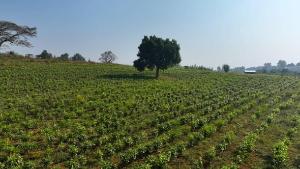
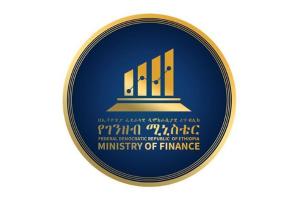
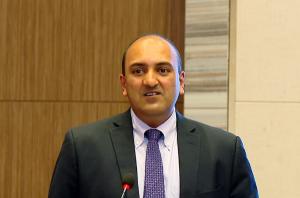
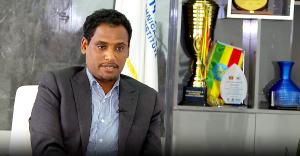
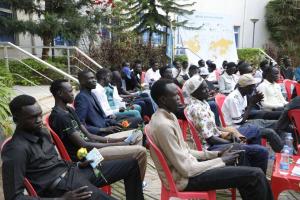






.jpg)
.jpg)
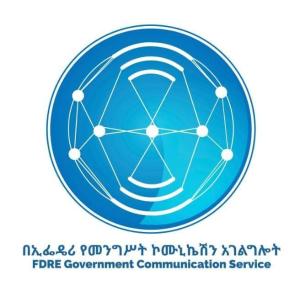
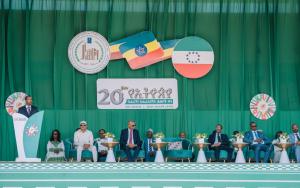
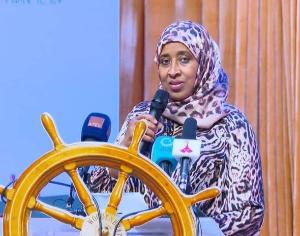
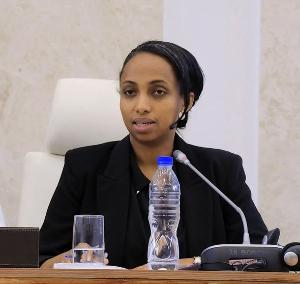
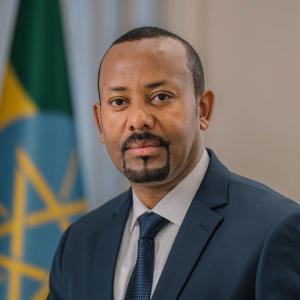
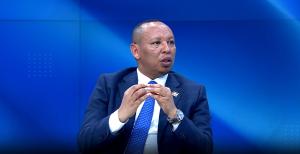
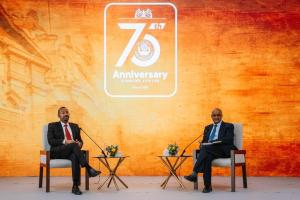
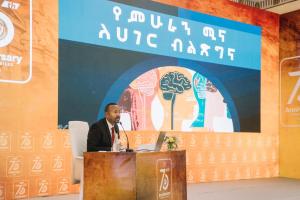
.jpg)
.jpg)

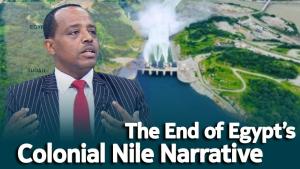

.jpg)
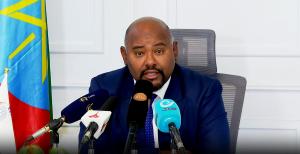



.jpg)

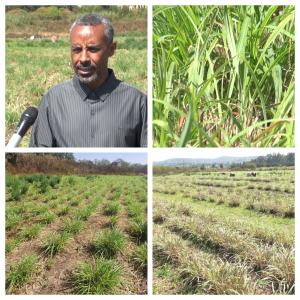
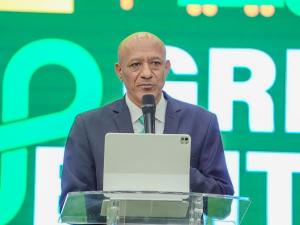

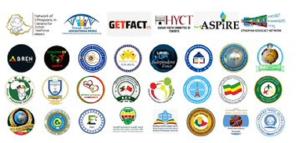

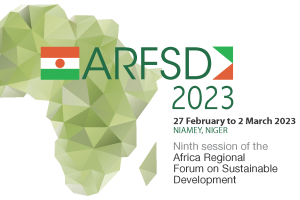
.jpg)
